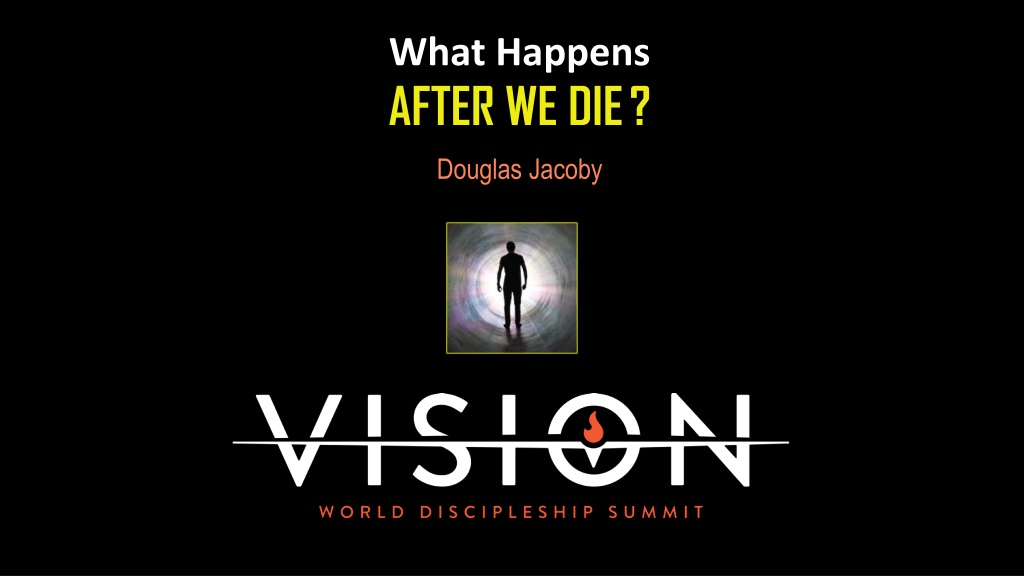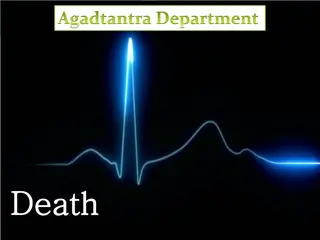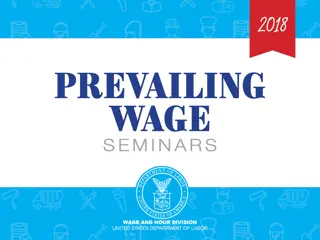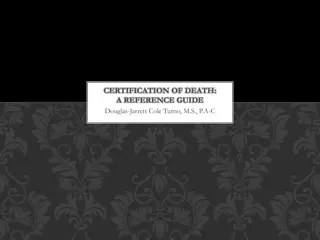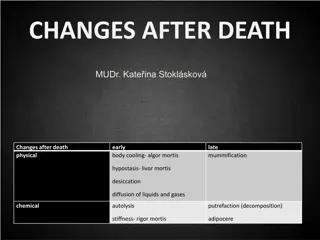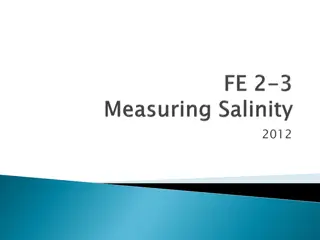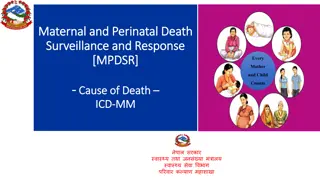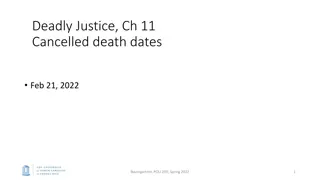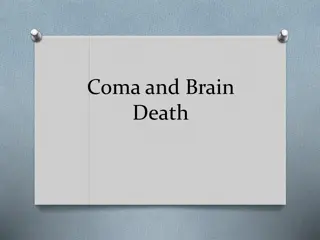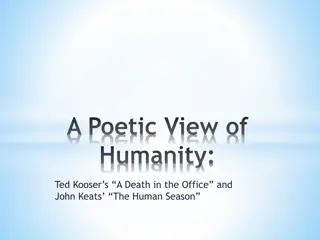Understanding the Afterlife: Insights from Douglas Jacoby
Explore the concept of life after death through a biblical lens with insights from Douglas Jacoby. Delve into topics such as the intermediate state, Heaven, Hell, and common objections. Uncover perspectives from early Church fathers like Justin Martyr and Tertullian, shedding light on the notion of Paradise and the awaiting judgment for souls. Discover thought-provoking discussions on the spiritual realm and the mysteries beyond death.
Download Presentation

Please find below an Image/Link to download the presentation.
The content on the website is provided AS IS for your information and personal use only. It may not be sold, licensed, or shared on other websites without obtaining consent from the author. Download presentation by click this link. If you encounter any issues during the download, it is possible that the publisher has removed the file from their server.
E N D
Presentation Transcript
What Happens AFTER WE DIE? Douglas Jacoby
What Happens AFTER WE DIE? Douglas Jacoby
0-4 5-12 13-25 26-62 63-88 89-120 Infancy Childhood Adolescence Maturity Prime Death / 2nd coming
THEREAREAFEW BIBLICALFACTS Yet not all our questions can be answered.
What Happens After We Die? Part I: The Intermediate State Part II: Heaven & Hell Part III: Common Objections Part IV: Final Thoughts Q&A
Part I The Intermediate State
INTERMEDIATESTATE OT Sheol Hebrew NT Hades Greek
PARADISE? Luke 23
INTERMEDIATE STATE No one in heaven yet! 1.John 3:13 Christian funerals! 2.Luke 23:42-43 paradise = heaven? 3.Phil 2:10-11 under the earth
HEAVENEMPTY (OFHUMANS)? John 3:13 Acts 2:34 1 Peter 3:22 Rev? Symbols
Early Church Fathers (Patristic Writers) 96-325 AD
Justin Martyr, a philosopher-turned-Christian (c. 160 AD): The souls of the pious remain in a better place, while those of the unjust and wicked are in a worse, waiting for the time of judgment. Awaiting judgment Judgment day hasn t yet happened There is apparently no second chance
If we move ahead almost 40years, we come to the time of Tertullian. Tertullian was a north African lawyer, one of the most colorful patristic writers. And if we speak of Paradise, the place of heavenly bliss appointed to receive the spirits of the saints, severed from the knowledge of this world by that fiery zone as by a sort of enclosure... Paradise: not as the place our bodies go, but a place to receive the spirit of the saints. Also notice Tertullian says that it s a place of divine bliss not a place where people are unconscious. And yet as he mentions the departed saints (meaning any Christian who has died), they are cut off from the knowledge of this world. In other words, in his opinion, they are unaware what s happening in the land of the living.
If we move ahead almost 40 years, we come to the time of Tertullian. Tertullian was a north African lawyer, one of the most colorful patristic writers. And if we speak of Paradise, the place of heavenly bliss appointed to receive the spirits of the saints, severed from the knowledge of this world by that fiery zone as by a sort of enclosure... Paradise: not the place our bodies go, but a place to receive the spirit of the saints. Also notice Tertullian says that it s a place of divine bliss not a place where we re unconscious. And yet as he mentions the departed saints (meaning any Christian who has died), they are cut off from the knowledge of this world unaware what s happening in the land of the living.
Lets now move ahead another 50 years or so to AD 250, the time of Cyprian, another early church father. At this time a number of wrong doctrines were beginning to blossom, yet the teaching about paradise was still consistent with what we read in the New Testament. We regard Paradise as our country we already begin to consider the patriarchs as our parents: why do we not hasten and run, that we may behold our country, that we may greet our parents? There a great number of our dear ones is awaiting us, and a dense crowd of parents, brothers, children, is longing for us, already assured of their own safety, and still solicitous for our salvation.
With that in mind, lets return to the words of Justin Martyr: For if you have fallen in with some who are called Christians [Gnostics] but who do not admit this [truth], and venture to blaspheme the God of Abraham, and the God of Isaac, and the God of Jacob; who say there is no resurrection of the dead and that their souls, when they die, are taken to heaven; do not imagine that they are Christians. Irenaeus, a church leader in Lyon, Gaul [France], wrote around AD 180: But these men are in all points inconsistent with themselves, when they decide that all souls do not enter into the intermediate place, but those of the righteous only.
AFTER DEATH: THE ORDER
Live & die Wait Rise & be judged Receive eternal life or hell
Irenaeus (Gaul, c.180) said, in reference to Luke 6:40: Our Master did not at once depart, taking flight [to heaven], but awaited the time of His resurrection prescribed by the Father, which had been also shown forth through Jonah, and rising again after three days was taken up [to heaven]; so ought we also to await the time of our resurrection, prescribed by God.
Hippolytus, around AD 195: But now we must speak of Hades, in which the souls both of the righteous and the unrighteous are detained. Hades is a place in the created system, rude, a locality beneath the earth, in which the light of the world does not shine; and as the sun does not shine in this locality there must necessarily be perpetual darkness there.
Notice the cosmology: This locality has been destined to be as it were a guard house for souls, at which the angels are stationed as guards, distributing temporary punishments for different characters. And in this locality there is a certain place set apart by itself, a lake of unquenchable fire into which we suppose no one has ever yet been cast; for it is prepared against the day determined by God, in which one sentence of righteous judgment shall be justly applied to all. But the righteous shall obtain the incorruptible and unfading kingdom, who indeed are at present detained in Hades, but not in the same place with the unrighteous.
Hippolytus continues: For to this locality there is one descent, at the gate whereof we believe an archangel is stationed with a host. And when those who are conducted by the angels appointed unto the souls have passed through this gate, they do not proceed on one and the same way; but the righteous being conducted in the light toward the right, and being hymned by the angels stationed at the place, are brought to a locality full of light. And there the righteous from the beginning dwell, not ruled by necessity, but enjoying always the contemplation of the blessings which are in their view, and delighting themselves with the expectation of others ever new; and deeming those ever better than these. And that place brings no toils to them. There is neither fierce heat, nor cold, nor thorn; but the face of the fathers and the righteous is seen to be always smiling, as they wait for the rest and eternal revival in heaven that succeeded this location. And we call it by the name Abraham s bosom.
Now lets look at the other group, the unrighteous. Hippolytus says that when the righteous go into Hades, they are ushered off to the right. However, The unrighteous are dragged toward the left by angels who are ministers of punishment, and they go of their own accord no longer, but are dragged by force as prisoners. And the angels appointed over them send them along, reproaching them and threatening them with an eye of terror, forcing them down into the lower parts. And when they are brought there, those appointed to that service drag them on to the confines of hell. And those who are so near hear incessantly the agitation, and feel the hot smoke. And when that vision is so near, as they see the terrible and excessively glowing spectacle of the fire, they shudder in horror at the expectation of the future judgment, (as if they were) already feeling the power of the punishment. And again, where they see the place of the fathers and the righteous, they are also punished there. For a deep and vast abyss is set there in the midst so neither can any of the righteous in sympathy think to pass it, nor do any of the unrighteous dare to cross it.
Also from Hippolytus: Thus far on the subject of Hades, in which all souls are detained until the time which God has determined; and then He will accomplish a resurrection of all, not by transferring souls into other bodies, but by raising the bodies themselves. In the fourth century, Lactantius wrote: Nor, however let anyone imagine that souls are immediately judged after death. For all are detained in one and a common place of confinement, until the arrival of the time in which the great Judge shall make an investigation of their deserts.
Also from Hippolytus: Thus far on the subject of Hades, in which all souls are detained until the time which God has determined; and then He will accomplish a resurrection of all, not by transferring souls into other bodies, but by raising the bodies themselves. Finally, in the fourth century, Lactantius wrote: Nor, however let anyone imagine that souls are immediately judged after death. For all are detained in one and a common place of confinement, until the arrival of the time in which the great Judge shall make an investigation of what they deserve.
HADESMORPHS Purgatory (ca. 400/500 AD) Protestants remove (1500s)
Part II Heaven & Hell
HEAVEN & HELL The apostles emphasized salvation from sin (and self) > hell-fire (Acts 2:40). What is symbolized is more, not less, real than the symbol. The Greek idea of the immortality of the soul entered Christianity in the 2nd century. 1. 2. 3.
IS THE SOUL IMMORTAL? 1. The Greek idea of immortality of soul entered Christianity in the 2nd century. 1 Tim 1:17, 6:16 2. The soul can be destroyed Matt 10:28
IS THE SOUL IMMORTAL? Now to the King eternal, immortal, invisible, the only God, be honor and glory for ever and ever. Amen. Who alone is immortal and who lives in unapproachable light, whom no one has seen or can see. To him be honor and might forever. Amen. 1 Tim 1:17; 6:16
HEAVEN & HELL The apostles emphasized salvation from sin (and self) > hell-fire (Acts 2:40). What is symbolized is more, not less, real than the symbol. The Greek idea of the immortality of the soul entered Christianity in the 2nd century. Luke 16:19-31 is a parable. Purgatory is not completely wrong. 1. 2. 3. 4. 5.
Purgatory articulated by 590 AD (Pope Gregory)
HEAVEN & HELL The apostles emphasized salvation from sin (and self) > hell-fire (Acts 2:40). What is symbolized is more, not less, real than the symbol. The Greek idea of the immortality of the soul entered Christianity in the 2nd century. Luke 16:19-31 is a parable. Purgatory is not completely wrong. Heaven is relational. 1. 2. 3. 4. 5. 6.
Part III Common Objections
COMMONOBJECTIONS? Cloud of witnesses in heaven (Hebrews 12)? Rich man already in hell (Luke 16)? Near Death Experiences? With the Lord (2 Corinthians 5)? It goes against our tradition (Mark 7)! The worm & the fire consume forever (Isa 66).
Part IV Final Thoughts
THINGSTO CONSIDER 1. God is fair (Gen 18:25). 2. Reincarnation (unbiblical Heb 9:27) isn t resurrection. 3. At the end, there will be only one kingdom, not two (1 Cor 15:28). 4. Hell comes to an end (Isa 66:24; Matt 10:28; 2 Thess 1:9). 5. The soul isn t innately immortal (1 Tim 1:17; 6:16). 6. Prepare logistically! 7. Prepare spiritually!
FOR MORE INFORMATION Douglas Jacoby dj@douglasjacoby.com https://www.douglasjacoby.com
